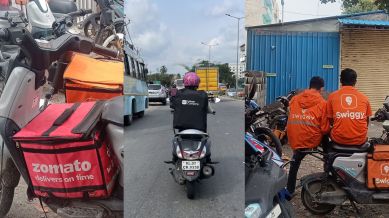Stay updated with the latest - Click here to follow us on Instagram
Amazon Flex, Flipkart and Uber failed to give fair pay, safe working conditions for gig workers: Fairwork India Report 2024
The Fairwork India Report 2024 showed Amazon Flex, Flipkart, Porter, Uber, and others emerged as key under-performers among the 11 platforms evaluated.

Despite the rising influence of the gig economy, major disparities in the treatment of platform workers exist, with several companies drastically underperforming on fair labour standards, according to the Fairwork India Report 2024.
Released by the Centre for Information Technology and Public Policy (CITAPP) at the International Institute of Information Technology Bangalore (IIITB), the report showed among the 11 platforms evaluated, Amazon Flex, Flipkart, Porter, Uber, and others emerged as key under-performers, failing to meet basic criteria for fair pay, contract transparency, and worker representation. The Fairwork India team assessed these platforms on five principles: fair pay, fair conditions, fair contracts, fair management, and fair representation.
The findings, which use a combination of desk research and worker interviews, present a stark reality about labour conditions in India’s growing gig economy. Amazon Flex, the last-mile delivery arm of Amazon, scored only 2 out of 10, reflecting its inability to meet most of Fairwork’s principles. While it achieved the first point for fair conditions by providing some safety equipment and training to its workers, it fell short in every other category. According to the report, the platform failed to ensure fair pay, as workers’ earnings did not consistently meet local minimum wage standards, especially after accounting for work-related costs like fuel and vehicle maintenance. In terms of fair contracts, fair management, and fair representation, Amazon Flex did not meet the required thresholds, signalling a severe lack of contract transparency, grievance redressal mechanisms, and worker collective voice, according to the Fairwork India Report 2024.
Fairwork India Report 2024 showed Flipkart, one of India’s largest e-commerce platforms, performed even worse, scoring a mere 1 out of 10. The only point Flipkart earned was under Fair Management, for providing workers with a basic channel to appeal disciplinary actions. However, this limited success was overshadowed by its failures in other areas. Flipkart did not meet the standards for fair pay, meaning workers are not guaranteed to earn at least the minimum wage after work-related costs. Additionally, Flipkart’s contract terms were criticised for being unclear and inaccessible to workers. The platform also lacked transparency in its management processes and made no efforts to recognise worker representation, leaving labour unions and worker collectives sidelined.
Porter, a logistics platform, and Uber, the global ride-hailing giant, scored the lowest in the report, with zero points across all five Fairwork principles. These platforms failed to provide evidence of even the most basic labour protections. Workers on both platforms are exposed to unsafe working conditions, with no adequate risk mitigation measures in place, according to the report. Additionally, their contracts are often complicated and offer little protection against liabilities, leaving workers vulnerable to sudden deactivation or payment issues without any means of appeal, added the report.
However, only BigBasket and Urban Company were awarded the first point under fair pay for instituting a minimum wage policy that guaranteed all their workers earn at least the hourly local minimum wage after factoring in work-related costs. Additionally, only BigBasket, Swiggy, Urban Company, Zepto and Zomato were awarded the second point for providing workers with accident insurance coverage at no additional cost, monetary compensation for income loss in cases they are unable to work due to medical reasons other than accidents, and for ensuring a worker’s standing is not negatively affected when they return after a break taken with prior notice to the platform.